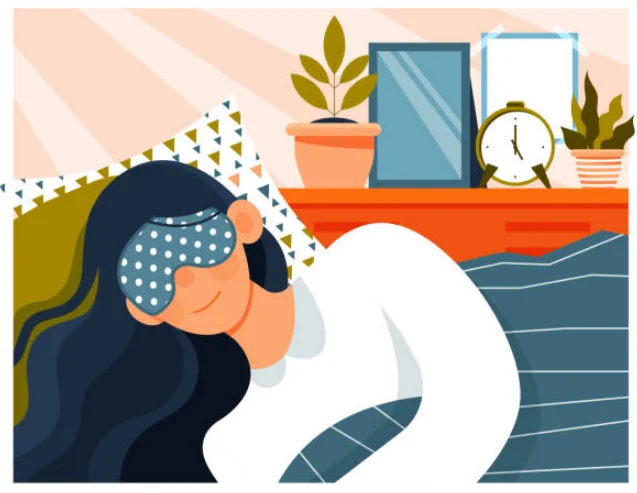~ Raunak Ranjan & Prakriti Prakash
Sleep has been described as a naturally occurring phenomenon by which an individual is able to revitalise his body, mind and soul.
Scientifically speaking, during sleep an individual is able to regenerate the energy molecules of the body more efficiently which helps us to function better.
Sleep is seen to affect one’s personality and health as well.
AFFECT ON HEALTH
PHYSIOLOGY AND PHASES OF SLEEP
Sleep is generally induced due to an increase in a certain hormone, termed melatonin, which is secreted by the pineal gland. Its levels are seen to be increased during night time and decreased during day time hence maintaining our circadian rhythm and sleep cycle
A single sleep cycle consists of 2 phases, NREM (non-rapid eye movement) and REM (rapid eye movement).
NREM is described as the period of deep sleep, whereas dreams are more common during REM sleep.
Each cycle lasts for 90 minutes and a single good night’s sleep consists of 4-6 such cycles.
HOW MUCH SLEEP IS REQUIRED BY AN INDIVIDUAL?
Each individual requires different amounts of sleep during different phases of his life i.e. the amount of sleep generally depends on the age group of the individual.
As one ages, his requirement for sleep generally reduces. For instance, a child might require anywhere from 9-13 hours of sleep everyday to be healthy, but a teenager might suffice with 8-10 hours of sleep. Adults on an average require 7-8 hours of sleep everyday. But the amount and pattern of sleep may differ practically in all individuals due to physiological differences between them.
ADVANTAGES OF PROPER SLEEP
During sleep, the brain tends to form new circuits which help in increasing the memory and retention properties of an individual. During sleep, there is also an increased production of infection-fighting substances like antibodies and cytokines, which helps you fight off viruses and bacteria.
Sleep makes an individual energetic so that they can do more physical activity, which helps them become healthier and less prone to obesity and diabetes. Sleep also plays a vital role in keeping a check on your blood pressure and blood glucose, which reduces the risk of having hypertension and diabetes again. Increased levels of growth hormone are also seen during sleep which is essential in the growth of children and individuals of the adolescent age group.
DISADVANTAGES OF LACK OF SLEEP
Sleep deprivation may be associated with increased irritability, depression, lack of concentration, mood swings and decreased immunity which may lead to increased risk of respiratory and other infections, with less sleep also being a risk factor for diabetes and other heart conditions.
To attain a healthy sleep schedule one should limit daytime naps, refrain from having caffeine at night, go to bed at the same time each night, wake up at the same time every morning, and spend an hour before bed doing relaxing activities such as reading, meditating. Avoid heavy meals within a few hours before bedtime and refrain from using electronic devices right before bed and exercising regularly.
EFFECTS ON PERSONALITY
Being a night owl or early bird is not just about your time preference of going to bed, rather it is intricately related to one’s personality as well. There have been multiple studies that have found that those who prefer to sleep early and those who find it better to sleep late have different, at times contrasting personalities.
On the basis of:
A.COOPERATION
When it comes to being cooperative, early birds are ahead of night owls. Former have a higher level of agreeableness and find it easy to work in groups, unlike latter who generally are not inclined towards teamwork and cooperation.
B. PERSISTENCE
Morning types also take a lead when it comes to being persistent. This trait is linked to their proactive nature. Night owls, on the other hand, show very low levels of persistence. This outcome has been consistent in almost all the studies conducted in this regard.
C. PROCRASTINATION Night owls tend to procrastinate more than early birds. They are also found to be more indecisive than early birds. All this shows why morning birds lead in the academic front and work arena.
D. CREATIVITY
Night owls are ahead of morning people when it comes to being creative. They are more open to new ideas and tend to think out of the box. Early risers, on the other hand, tend to be more analytical rather than creative.
Overall, it can be said that both personalities are unique and have their own advantages and disadvantages. And it is not entirely in our control to choose what we want to be because genes play a deciding role in determining what our circadian rhythm or chronotype will be. Of course, we can try to change it to a certain level, but it is difficult to do so entirely because our body has its own clock. Therefore, it is advised to take advantage of your personality type accordingly.
CONCLUSION
On a concluding note, it can be reckoned that sleep plays a far more important role in our life than we tend to acknowledge. In the hustle-bustle of modern life, we must not compromise on our physical and mental health and a good amount of sleep is essential for both. We need to pay attention to our quantity and quality of sleep so that we are ready to face all the challenges life throws at us. By completing the required amount of sleep with your involved circadian rhythm, an individual can very well be productive, happy and healthy.
Must Read– https://skchildrenfoundation.org/do-we-need-to-escape-this-internet-matrix-or-adapt/





